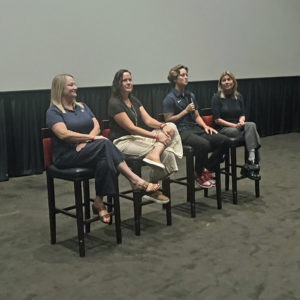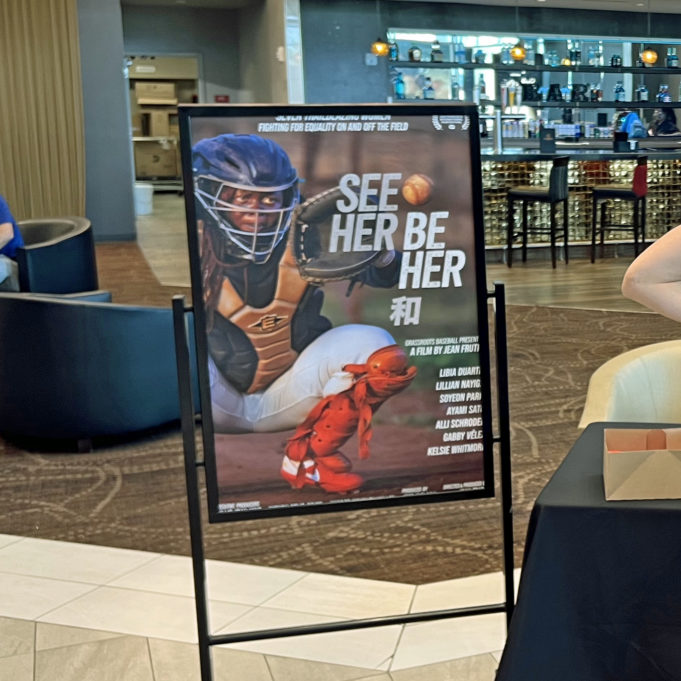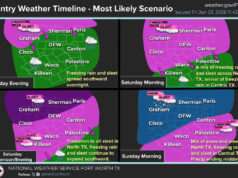Yesterday, I attended a screening of a documentary film about baseball. Do you know what the game footage scenes looked like?
They looked like baseball.
They featured nasty hard-breaking curveballs, home runs over the wall, and diving catches.
And so you’re, like, duh. Why did you even take up the space to write that?
I did it because there was something unexpected amidst the normal elements: the players were women. And that’s not something people think of when they think of hardball.
Softball, yes. Basketball, soccer, tennis, golf, and many more have become sports in which fans expect to see women competing. But the national pastime, not so much.
The documentary, entitled “See Her Be Her,” tells the stories of players of various nationalities who participated in the most recent Women’s Baseball World Cup in 2024. It also provides an education on the big picture of women’s participation in the old ballgame. We find out a few things. One is that, yeah, they can play. The world’s best women’s ballplayers are good at baseball. Their bat-and-ball sport mastery should honestly come as no surprise if you’ve ever watched high-level women’s fastpitch softball or cricket. We also discover that they’ve all been told at one point or another, usually many times, that they shouldn’t play baseball because of their gender. Girls, we learn, have often been directed to switch to softball even if they preferred baseball, or they had to play on boys teams, or they just gave it up altogether.
 The screening took place at a Dolby Cinema at AMC location in Austin. After the movie, a Q&A took place featuring Round Rock Express SVP of Marketing Laura Fragoso, SMU adjunct professor and former MLB DEI Director Catalina Villegas, Team USA catcher Denae Benites, and Jean Fruth, the film’s director/producer. Benites received a preponderance of the audience questions, many of which came from the young ballplayers in the crowd.
The screening took place at a Dolby Cinema at AMC location in Austin. After the movie, a Q&A took place featuring Round Rock Express SVP of Marketing Laura Fragoso, SMU adjunct professor and former MLB DEI Director Catalina Villegas, Team USA catcher Denae Benites, and Jean Fruth, the film’s director/producer. Benites received a preponderance of the audience questions, many of which came from the young ballplayers in the crowd.
I sat next to a woman who had brought her baseball-playing daughter. The mom remembered loving to pitch as a kid but was told to give up baseball and pick up softball. Another woman mentioned she’d given up the game and eventually became a gymnast because that was something a girl could do. Benites talked about never getting off the bench in her two years of high school (boys) baseball.
The film hopes to make a contribution toward creating more opportunities for girls to play. Interviewees like Cal Ripken, Jr. and Ichiro Suzuki help make the case that women deserve an opportunity to play the game that put them in the Hall of Fame. The piece includes a look at an Ugandan girls baseball program and Fruth co-founded an organization with former Baseball Hall of Fame President Jeff Idelson called Grassroots Baseball. Their nonprofit aims “to promote and celebrate the amateur game around the globe” while addressing “historically underserved communities through the power of sports.” They’re pushing this film (available to stream on Prime Video) and its companion book to help make the case for women in the game and, indeed, some progress has been made. Next year, Benites will likely be one of the players in a new women’s professional league starting up in the U.S.
It helps that more and more women like Fragoso and Villegas have joined the front offices of baseball organizations. And, of course, it’s huge when a group of girls like the ones in the cinema yesterday can meet a Denae Benites and witness on the screen that she and others like her can play ball at a professional level. They need to see it to know they can be it.
Why does it matter? The film provides a glimpse of that, too. While young athletes can be inspired by the pros, even a robust women’s pro league would only provide on-field jobs for a small number of athletes. But when these girls get to play, especially a game they love and will devote themselves to, they learn skills and mindsets that will help them succeed in life no matter what they do professionally. One of the players profiled in “See Her Be Her” also has a job as a pilot. Another fights wilderness fires. I have no doubt that the perseverance they developed in sticking with baseball benefits them in those demanding (and sometimes male-dominated) pursuits. Those are stories of success worth watching.












